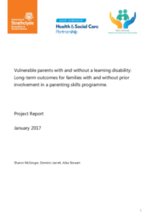Executive Summary
Families including a parent or parents with a learning disability can often have complex needs linked to issues such as poverty and mental health, and are known to be overrepresented in child care proceedings. Previous local project work with 12 families had demonstrated the potential of providing intensive support to parents with a learning disability, as well as others without a learning disability who were vulnerable for other reasons. A follow-up project 16 years later sought to re-engage with those families in order to explore their outcomes. Parents, children, and 3 key professionals involved with each family were to be interviewed; however, following recruitment issues, only parents from 3 of the original families participated, with parents with a learning disability from 2 other families being recruited to provide an additional perspective.
Interviews with the parents and 11 professionals affirmed much that is familiar from the existing literature, including services being slow to offer support, but at times quick to judge. However, very positive experiences were described of professionals acting flexibly in an ideal realization of their role (e.g., long-term involvement from a general practitioner with a whole family; hands-on, respectful support from a Social Worker), as well as the love for their children evidenced by the parents interviewed. Of the 5 families interviewed, only 1 had their children within their own custody, affirming the high rate of removal of children identified elsewhere in the literature. However, all the parents interviewed maintained an active role in their children‟s lives.
The achievements of the parents were recognized by those professionals interviewed, who also offered a wide variety of insights into how they aim to work with parents with a learning disability. These reflected issues such as the need to be respectful of the parent and their experiences; to take a broad perspective on the family circumstances, and not just focus on the parent; to understand their communication and support needs, and adapt information and training as appropriate; to aim for consistent, long term, flexible support; and to listen.
In many respects, the observations of parents and professionals underlined the importance of achieving and sustaining a positive, trusting relationship with parents. This, rather than the need for input from any particular profession or service, was one of the key findings for the project. While this is less readily discussed or perhaps realized than the need for additional resources or new pathways, it is none-the-less a fundamental element of successful partnerships, which needs to be considered. Reflecting the project‟s findings, the following recommendations are offered:
- Basic awareness of the support needs of people with a learning disability, and parents with a learning disability in particular, should be provided to all those working with children and families. This should be promoted on the basis of a social systems definition of learning disability: the relevance of this training for other individuals who may exhibit similar needs in relation to learning and support, but who do not have a "learning disability‟ label, should be emphasised.
- Positive messages in relation to the successful realisation of distributed parenting should be promoted across communities. Parenting by communities/extended networks as opposed to solely by biological parents is not a new concept, and should be recognised and welcomed as a valid option. Where distributed parenting is being employed, attention should be paid to ensuring the continuing, meaningful involvement of the supported parent(s) themselves.
- Partnerships between parents and staff should be informed by more than just a consideration of needs and relevant roles. While a commitment to long-term involvement, such as that recommended within the Scottish Good Practice Guidelines, provides opportunity for positive relationships to emerge, creating the right conditions for those relationships from the outset is a legitimate area to focus on. Realising this within resource constrained services will be challenging, but can be enabled by positive practice in team leaders (knowing their staff as individuals as well as practitioners); flexible responding to referrals (allocating on a more measured basis than the basic fitting together of needs and roles); and encouraging staff to recognise when they are not the right fit for a family, and act on it.
- Further work should be undertaken to explore the outcomes for children of parents with learning disabilities, specifically in relation to: frequency and nature of their role as young carers; college experiences and the impact of stigma/isolation; employment outcomes.
- Staff should be encouraged to reflect and act on the wellbeing of the broader family, where they become involved with parents ostensibly for reasons other than parenting. It is recognised that the current dialogue in relation to the implementation of the Named Person role has highlighted real concerns with regard to the perceived excessive intrusiveness of services. This highlights the need for sensitivity when practising holistically in relation to the needs of an individual and their family.
- Staff should be encouraged to consider the needs of parents not just as parents, but also as individuals in their own right, and to explore with the parent opportunities in relation to this.

